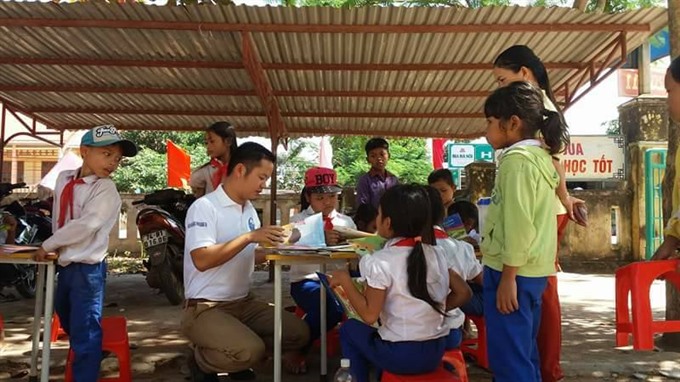 Society
Society

On Lunar New Year’s Eve in 2018, a group of six walked from Đông Hà City’s Cultural Centre to Lê Duẩn Park, presenting books to every child they met on the road. The 300 books distributed in just one night, the walkers hoped, would motivate children to cultivate a life-long habit of reading.
 |
| Lê Minh Tuấn (second, left) joins a reading session with students. - Photo courtesy to Sách hoá nông thôn Quảng Trị |
by Khoa Thư
QUẢNG TRỊ — On Lunar New Year’s Eve in 2018, a group of six walked from Đông Hà City’s Cultural Centre to Lê Duẩn Park, presenting books to every child they met on the road. The 300 books distributed in just one night, the walkers hoped, would motivate children to cultivate a life-long habit of reading.
Lê Minh Tuấn, 27, is an engineer at Quảng Trị Province Irrigation Management and Operation Limited Company and an co-owner of a private artificial turf football field. On Facebook, however, he is widely recognised as the initiator of Sách hoá nông thôn Quảng Trị (Countryside bookshelves in
Located in the former demilitarised zone during the American war in Việt Nam, the northern central province of Quảng Trị suffers the highest contamination level of explosive remnants of war—more than 80 per cent of the land area is affected. Construction efforts, therefore, focus mostly on unexploded ordnance (UXO) clearance and poverty reduction.
Beyond basic amenities, Tuấn has taken an initiative to raise public attention on literacy, first and foremost with a habit of reading. That goal has raised in him questions of how to accelerate civic engagement and promote public-private-partnerships in policy advocacy.
In August 2015, Tuấn started Sách hoá nông thôn Quảng Trị by buying books, aiming to present them to local primary schools. However, back then, potential receivers did not seem interested.
“I was unprepared. My charity group distributed free meals for poor patients at four provincial hospitals every week. As people visibly enjoyed and benefited from the activity, I thought that giving away a book was as easy as providing a meal,” recalled Tuấn.
The indifference of schools, he thought, was due to the programme’s lack of reputation.
“How could they receive my books without knowing who I was. The goal of presenting 3,000 bookshelves for local schools, therefore, was too ambitious,” he said.
“Sách hoá nông thôn Quảng Trị does not follow a model of a public library. What we want is to increase the access of children to good sources of books by setting up bookshelves in their own classrooms. Therefore, to promote the reading habit, it is essential for schools and related public agencies to cooperate and organise reading time for students,” he said.
While some district authorities pay no attention to the programme, others are willing to take part, including Triệu Phong and Hải Lăng districts. Principals of schools in those localities even approached him, asking for cooperation in setting up classroom bookshelves. The provincial Department of Education and Training, in the meantime, issued a regulation demanding local schools to have bookshelves at every classroom. This created favourable conditions for his project to develop.
Hundreds of students at more than ten schools in
Systematic procedure
Tuấn describes the process of book donation as sensitive and complicated as it involves many stakeholders and has significant impacts on children.
Only brand new books which are highly recommended by publishing houses are chosen and divided into different categories such as classics, life skills or sciences. The books then will be checked, stamped and sealed by staff of Sách hoá nông thôn and delivered to schools. Representatives of schools have to sign in lists indicating books’ titles, publishing houses and barcodes.
“As an independent group, we have to be careful in every step to make sure that books are useful for students,” he said.
Cooperators highly appreciate Tuấn’s professionalism.
“Embracing transparency helps the project to develop sustainably. It reinforces the belief of volunteers and donators in Tuấn’s initiative and spreads the value of reading,” said Đào Tâm Thanh, a journalist of Quảng Trị newspaper who is also a project supporter.
Transparency and professionalism have helped the project turn a new page with the cooperation of the Quảng Trị Province Department of Information and Communication.
In 2018, the department chose Sách hoá nông thôn Quảng Trị as a major partner to implement classroom bookshelves at Triệu Phong District’s Triệu Long 1 and 2 primary schools. Events celebrating Việt
“Cooperation brings positive impacts on both the department and Sách hoá nông thôn Quảng Trị. While the book day will be better organised, the programme will gain more attention from individuals and local authorities. The reading habit, hopefully, will be strongly promoted,” said Đoàn Nam Phương, the department officer.
After granting books for children, in the near future, Tuấn aims to encourage all people to read more. Besides Sách hoá nông thôn Quảng Trị, he owns a private library of more than a thousand books, freely open to public, and conducted the book distribution event on New Year’s Eve.
“Reading habits can be only cultivated when people have free accesses to books. With a model borrowed from Sách hoá nông thôn Việt




